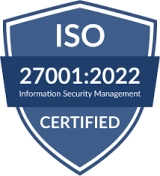Share on:
Do you want to ensure your small business meets all its accounting requirements effectively?
We’ve compiled a 20-item checklist that every small business should follow to maintain efficient accounting practices and requirements effectively.
Maintaining precise and current documentation is essential to the prosperity and durability of any small enterprise.
If you are a small business owner or looking to start one, here is a thorough accounting checklist that you should adhere to, to maintain compliance and financial stability in your business.
Without much ado, let’s get straight to the point!
Top 20 Business Accounting Checklist
Here are the top 20 essential accounting checklists that every small business needs to complete to ensure financial integrity and success.
1. Separate Your Personal finances From Your Business Finances
Keeping personal and business costs apart is the first step in managing your company's budget. Create a special bank account for your company and use it only for business-related activities. This helps facilitate tax filing and also helps with proper bookkeeping.
2. Track All Your Business Income and Expenses
Accounting relies heavily on the accurate recording of all income and costs. To keep track of every transaction made, use spreadsheets or accounting software. This will help you in keeping an eye on your cash flow and understanding your financial situation.
3. You should Also Maintain Accurate Records
Make sure that all financial documentation is kept up to date. Payroll data, bank statements, invoices, and receipts are all included in this. For the goal of creating financial statements and filing taxes, accurate records are important.
4. Monitor Accounts Receivable
To guarantee that clients pay on time, keep a careful check on accounts receivable. Establish a method to monitor unpaid bills and pursue unpaid bills.
5. Manage Accounts Payable
Keep an eye on accounts payable in the same way that you do receivables. To keep excellent ties with suppliers and stay out of late payments, pay your payments on time. Take into account automating payments for ongoing costs.
6. Regularly Reconcile Bank Accounts
Make frequent, ideally monthly, bank account reconciliations. This entails verifying that your accounting records and bank statements match. The importance of this is that it helps to prevent fraud and inconsistency in your transactions.
7. Record Cash Transactions
Keep track of every transaction, regardless of size. This makes sure that any money coming into and going out of your company is reflected in your books. For minor outlays, use petty cash vouchers, and be sure to continually reconcile them.
8. Keep Track of Inventory
If your business deals with physical products, maintain an accurate inventory. Track stock levels, monitor inventory turnover, and record any discrepancies. Proper inventory management helps in cost control and prevents stockouts or overstocking in your business.
9. Prepare Financial Statements
Regularly prepare key financial statements, including the income statement, balance sheet, and cash flow statement. These reports provide insights into your business’s financial health and aid in decision-making moving forward.
10. Seek Professional Advice
Consider hiring an accountant or bookkeeper, especially as your business grows. Professionals can provide valuable advice, handle complex accounting tasks, and ensure compliance with tax laws. Their expertise can save you time and money.
11. Budget and Forecast
Create a budget and financial forecast for your business. A budget helps in planning and controlling expenses, while a forecast projects future financial performance. Regularly compare your actual results to your budget to monitor progress and adjust when needed.
12. Monitor Cash Flow
Cash flow is the lifeblood of any business. Regularly monitor your cash flow to ensure you have enough funds to cover operating expenses and unexpected costs. Implement strategies to improve cash flow, such as offering discounts for early payments.
13. Set Aside Funds for Taxes
Set aside a portion of your income for taxes to avoid a large tax bill at the end of the year. Understand your tax obligations and deadlines, and make estimated tax payments if required. Consulting a tax professional can help ensure compliance.
14. Review Financial Reports Monthly
Review your financial statements at least once a month. Analyze your income, expenses, profits, and cash flow. Identifying trends, patterns, and variances early allows you to make informed decisions and address issues on time.
15. Track Business Expenses for Deductions
Keep detailed records of all business expenses to maximize tax deductions. Common deductible expenses include office supplies, travel, and marketing costs. Ensure you have receipts and documentation to support your claims.
16. Back Up Financial Data
Regularly back up your financial data to protect against data loss. Use cloud storage or external hard drives to keep copies of your records. Having backups ensures you can recover your data in case of technical issues or disasters.
17. Conduct Internal Audits
Perform regular internal audits to review your financial processes and controls. Internal audits help identify inefficiencies, errors, and potential fraud. They also ensure compliance with accounting standards and regulations.
18. Stay Updated with Accounting Standards
Accounting standards and regulations change over time. Stay informed about updates that may affect your business. Joining professional organizations or subscribing to accounting newsletters can help you stay current.
19. Automate Where Possible
Consider automating repetitive accounting tasks. Automation allows you to focus on growing your business. Accounting software can automate invoicing, payroll, and expense tracking, saving time and reducing the risk of errors.
20. Review and Update Your Checklist
Finally, regularly review and update your accounting checklist. As your business evolves, your accounting needs may change. Regular reviews ensure your checklist remains relevant and effective in managing your business finances.
Final Thoughts
Effective accounting is crucial for the success of any small business. By following this comprehensive checklist, you can maintain accurate financial records, ensure compliance, and make informed decisions to drive your business forward.
FAQs
How often should I reconcile my bank accounts?
You should reconcile your bank accounts every month. Regular reconciliation helps find differences, prevent fraud, and keep your records accurate.
What should I do if my accounts payable records don’t match my bank statements?
If there are differences, check and fix errors, and make sure all transactions are recorded correctly. Regular reconciliation helps prevent these issues.
How can I record cash transactions effectively?
Record all cash transactions immediately, use petty cash vouchers for small expenses, and reconcile petty cash regularly. This keeps your records accurate.
What are the key financial statements I should prepare?
The key financial statements are the income statement, balance sheet, and cash flow statement. These reports help you understand your business’s finances.
How should I set aside funds for taxes?
Set aside part of your income for taxes based on your tax obligations and deadlines. Make estimated tax payments if needed, and consult a tax professional to make sure you comply.


Blessing Obiora
5 mins read


Blessing Obiora
5 mins read



